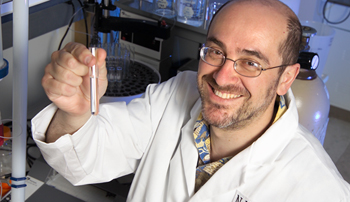There was a time when Alexander “Sasha” Kabanov, Ph.D., D.Sc., thought he would be a poet. When he was 8 he wanted to work in the Bolshoi Theatre.
 |
Alexander “Sasha” Kabanov, Ph.D., D.Sc. |
Today, in recognition of his accomplishments in nanomedicine, Dr. Kabanov will be named the 2009 Scientist Laureate, UNMC’s highest research honor. He, along with 22 UNMC investigators as distinguished scientists and new investigators, will be recognized in a 4 p.m. ceremony in the Durham Research Center Auditorium.
Sponsored by the chancellor, the Distinguished Scientist award recognizes UNMC researchers who have been among the most productive scientists in the country during the past five years.
|
Dr. Kabanov is known internationally for his breakthroughs in nanomedicine, said UNMC Chancellor Harold M. Maurer, M.D. “Sasha is one of UNMC’s premiere scientists. I saw first-hand how highly respected he is on our trip to Moscow.”
Dr. Kabanov’s work is in novel drug delivery systems that cross the blood brain barrier to treat cancer and neurodegenerative diseases and use polymer-based nanotechnologies to carry drugs and DNA to targeted sites.
His work with amphiphilic block copolymers, which protect drugs in the bloodstream until delivered to the target cell, to overcome multidrug resistance in cancer led to human clinical trials that are effective against resistant tumors.
“Dr. Kabanov is a uniquely innovative scientist who operates well in both the basic and translational realms,” said Tom Rosenquist, Ph.D., vice chancellor for research. “His creativity is exceeded only by his energy. He is an ideal model for a 21st-century scientist.”